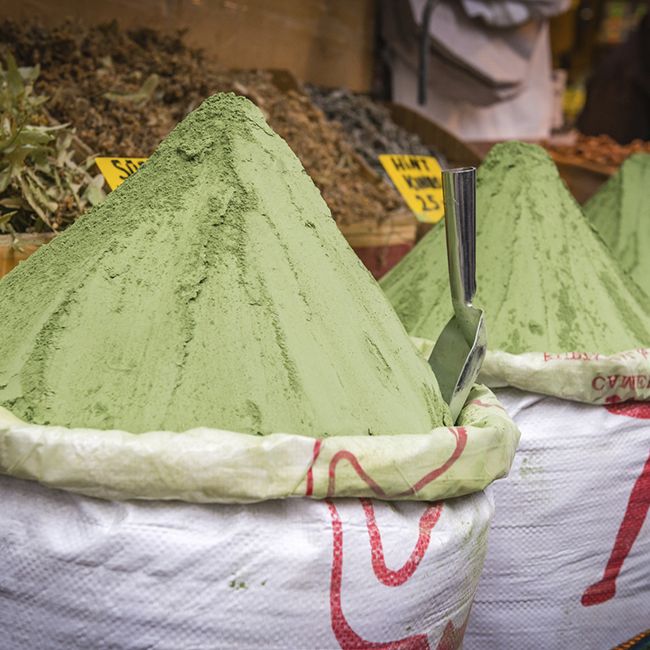Cassia Obovata and henna are similar but yield very different results when used on the hair. The benefits they both provide for hair are wonderful, but there are also disadvantages associated with each. If you are trying to choose which is best for your hair, the information below will help you decide.
Henna
Henna is a blooming plant with leaves containing red resin pigment. The color is released when the leaves are crushed and liquid is added to it. Many have used it for temporary body art and permanent hair color.
Pros
Henna is 100% natural and very inexpensive. It deters scalp issues such as dandruff, detoxifies the follicles, makes hair stronger, and leaves the hair feeling silky. Henna is able to penetrate the hair and adhere to the strands. The dye deposit fills in the gaps, which is how it is able to strengthen the hair. The color is long lasting and does not fade. The lighter colored your hair is, naturally, the more its reddish-orange color will show. On dark hair the color deposited is more visible in sunlight. If you have henna that is another color such as black or dark brown, then it has had dye added to it. The effects of henna can be noticed for approximately 4-5 weeks.
Cons
When mixing the henna for application it takes hours for the dye to release properly. It is good to mix it and let it sit for a few hours before application. When you are mixing, you will also find that it stains everything! Be sure to wear gloves and cover the surfaces of your workspace and bathroom prior to application.
It does not aid in moisture retention and it takes a while to soften. Some curlies find it has a very harsh or drying effect when used. For looser curl and wave patterns it can cause the hair to straighten with each application, which I experienced myself and is the reason I stopped using henna.
It is strongly advised against using henna on hair that has commercial grade hair dyes on it. It can also be problematic if you would like to color your hair after you have been using henna on it. It does not work as a traditional dye with a developer, and it only deposits color.
The red shades of the henna are hard to regulate due to it being a plant-based natural dye. Climate and location of where the henna was harvested can greatly impact the type of color deposited onto the hair. It will never lighten the color of your natural hair, and it can also darken your hair with continued use over time.
It is important to be very careful with henna that has additives as people have experienced negative effects from these additives.
While this may seem heavy on the cons, it’s important to note that whether or not you use henna is truly an individual preference, it may work well for some hair situations while it doesn’t work for others. For example blogger CurlyNikki has successfully been using henna for years to create a more voluminous look for her fine hair. On the other hand NaturallyCurly Editor Devri did not enjoy her henna experience because she likes to experiment and express herself through different hair colors, and after using henna she felt limited in her options. NaturallyCurly Editor Cristina has wavy, Type 2c hair and she used henna on her previously bleached blonde hair, so her results ended with dry, coarse hair and loss of curl definition.
Cassia Obovata
This is commonly known as neutral henna, but it isn’t henna at all. The leaves contain yellow resin pigment and it is well known for its conditioning and restorative properties.
Pros
Cassia Obovata is 100% natural and very inexpensive. It conditions the hair and makes it very soft. It takes less time to mix, because you don’t have to wait for the dye to release. It can be applied and rinsed out after 30-60 minutes. It does not stain like henna, so gloves are optional during application. Cassia Obovata also provides most of the same wonderful characteristics as henna without depositing noticeable hair color on dark hair.
This is excellent for those that do not want red hair. It does not loosen the curl pattern in the same manner that henna can. I never had an issue with Cassia straightening my hair. If you dislike protein treatments, it is a good choice for strengthening your hair. It makes the hair feel thicker, smoother, and provides a great sheen.
Cons
The effects of Cassia Obovata are not permanent like they are with henna. It will only last for approximately 2-3 weeks. You will have to continually maintain it in your hair care regimen in order to enjoy the benefits long term. It is not as strengthening as henna and it will deposit a yellowish tent on the hair if your strands are gray.
Which one should you use?
- If you are hoping to naturally color your hair a reddish color (and have not previously used hair dye”> then henna is going to be the choice for you. Just be aware of the potential for dryness or loss of curl definition, and be sure to avoid stains.
- If you want the benefits of a natural conditioner, without depositing color onto your hair, then go with Cassia Obovata.
Have you used henna or cassia? What were your results?

